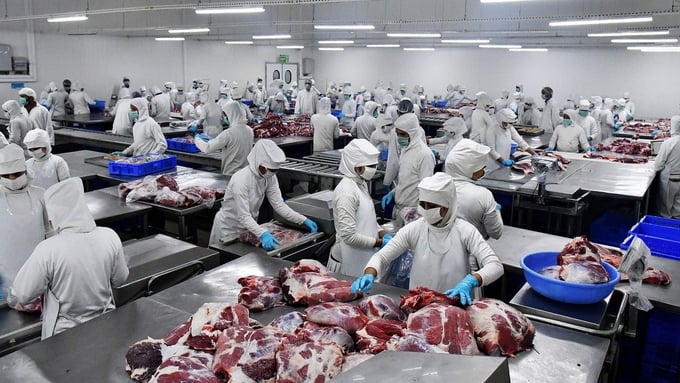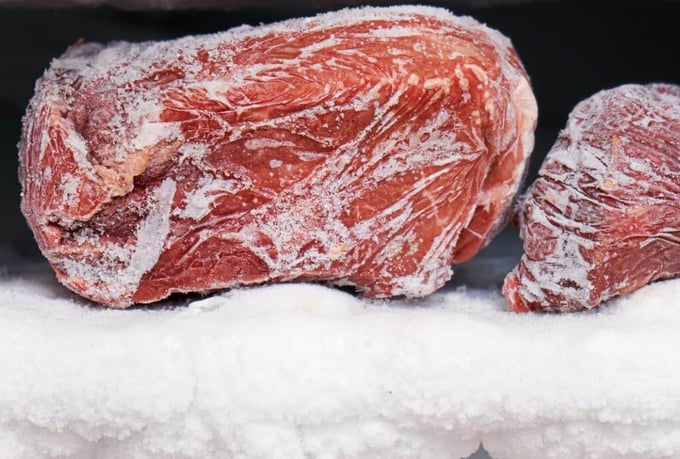June 20, 2025 | 21:48 GMT +7
June 20, 2025 | 21:48 GMT +7
Hotline: 0913.378.918
June 20, 2025 | 21:48 GMT +7
Hotline: 0913.378.918

According to statistical data, India is the largest meat supplier to Vietnam, with a total export volume of over 102,000 tons, accounting for 25.3% of Vietnam's total imports. This is an increase of 17.5% compared to 2023. Photo: TT.
During the first seven months of 2024, Vietnam imported over 450,000 tons of meat and animal by-products for food, which is an increase of 6.4% compared to the corresponding period in 2023.
Notably, meat products accounted for more than 320,000 tons, representing an increase of over 40%. These figures reflect the sustained demand for imported meat in Vietnam, despite the significant challenges facing the domestic livestock industry.
India stands as the largest meat supplier to Vietnam, with a total export volume of over 102,000 tons, accounting for 25.3% of Vietnam's total imports. This is an increase of 17.5% compared to 2023. Following India are the United States, Russia, Germany, and South Korea, which constitute 13.5%, 11.7%, 7.7%, and 7.57% of Vietnam’s total meat imports, respectively. Although several countries, such as the United States and Russia, experienced slight declines in exports, India and Germany saw significant growth.
However, the key issue lies not only in the volume but also in the quality of imported meat products. According to the Department of Animal Health (Ministry of Agriculture and Rural Development), following the enforcement of Circular No. 04/2024/TT-BNNPTNT on May 16, 2024, 55 out of the 6,679 examined shipments tested positive for Salmonella, accounting for nearly 1% of Vietnam's total meat import volume.
In the absence of Salmonella testing, the Vietnamese market can potentially be exposed to over 1,319 tons of contaminated animal meat. Consequently, contaminated meat products pose a high risk of disease outbreaks, food safety concerns, and threats to the health of Vietnamese consumers.
Vietnam's import quarantine process currently complies with legal regulations, with Salmonella-negative shipments requiring only one to three days to finalize procedures, whereas Salmonella-positive shipments require five to six days. Nonetheless, major exporting countries such as the United States, Australia, France, and South Korea have expressed concerns over Circular No. 04, suggesting that the new regulations can significantly challenge meat imports into Vietnam.
In response to these concerns, a representative from the Department of Animal Health affirmed that Circular No. 04 fully complies with international standards without posing as an obstacle to import businesses.
Between May and June 2024, Vietnam imported 59,461 tons of meat and meat products, a figure comparable to the corresponding period in 2023. This growth indicates that Circular No. 04 has not significantly affected meat imports into Vietnam, despite ongoing objections from several countries and businesses.

Countries that are currently importing meat from Vietnam, such as the EU, the UK, South Korea, and Japan, enforce strict requirements for controlling Salmonella and E.coli bacteria. Photo: TT.
In contrast with international standards, countries importing meat from Vietnam, including the EU, the UK, South Korea, and Japan, impose strict regulations on the control of Salmonella and E.coli. Accordingly, Vietnam must comply with these requirements when exporting meat, eggs, and dairy products to the aforementioned markets.
For example, the EU prohibits the presence of Salmonella in 25 grams of meat and imposes strict limits on E.coli. Similarly, countries such as Singapore, China, and Japan impose their own regulations regarding Salmonella monitoring for meat and animal products from Vietnam.
Vietnamese businesses and associations have submitted proposals to the Prime Minister and the Ministry of Agriculture and Rural Development with the aim of increasing control over imported products and protecting local livestock industries and consumer health.
Notably, CJ Vina Agri Group in Vietnam and the Vietnam Poultry Association have petitioned the government to implement measures with the goal of preventing the importation of undesirable livestock products, while also establishing technical barriers to protect the domestic market.
However, the importation of meat and animal products into Vietnam remains an unavoidable necessity against the background of global economic integration and the rising consumer demand.
As a result, quarantine measures, quality control, and strict compliance with international standards will be crucial in ensuring food safety and protecting consumer health. On the other hand, this initiative presents an opportunity for Vietnam to further boost domestic production, compete with imported products, and sustainably develop the livestock industry in the coming years.
Translated by Nguyen Hai Long

(VAN) The waste of resources from agricultural by-products and the situation of counterfeit and poor quality goods in production causing losses of thousands of billions were pointed out by the National Assembly deputy.

(VAN) After 5 years of implementation, the CAI initiative has helped coffee growers change their farming practices, moving toward responsible agriculture that meets global export standards.

(VAN) The primary prerequisite for the comprehensive and robust integration of Vietnam's livestock sector into the global value chain is the establishment of a disease control system.

(VAN) The results of national programs are essential for establishing a contemporary livestock sector that is well-equipped to meet the demands of both domestic and international markets, with robust biosafety standards.

(VAN) The UNESCO Global Geopark revalidation of Non nuoc Cao Bang and the transition to a two-tier administrative model are presently undergoing a pivotal moment in Cao Bang, the northernmost province of Vietnam.
/2025/06/13/5330-2-004539_953.jpg)
(VAN) Changing policy mindset and removing investment barriers are urgent requirements to open up new development space for enterprises in the agricultural sector.

(VAN) The areas include the restoration of five million hectares of marine ecosystems.